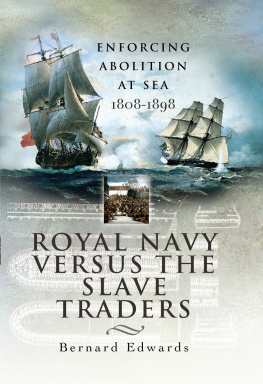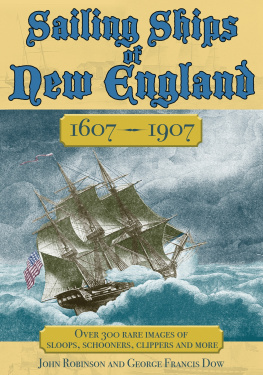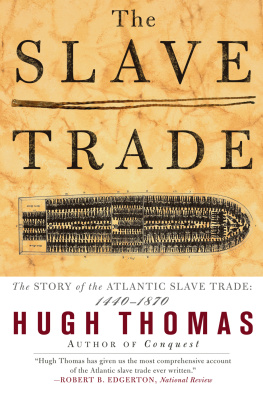BARTERING FOR SLAVES ON THE GUINEA COAST
From a colored lithograph in the Macpherson Collection

Published in Canada by General Publishing Company, Ltd., 895 Don Mills Road, 400-2 Park Centre, Toronto, Ontario M3C 1W3.
Published in the United Kingdom by David & Charles, Brunel House, Forde Close, Newton Abbot, Devon TQ12 4PU.
Bibliographical Note
This Dover edition, first published in 2002, is an unabridged republication of the work originally published by The Marine Research Society, Salem, Massachusetts, in 1927.
Library of Congress Cataloging-in-Publication Data
Dow, George Francis, 1868-1936.
Slave ships and slaving / George Francis Dow ; with an introduction by Ernest H. Pentecost.
p. cm.
Originally published: Salem, Mass. : Marine Research Society, 1927.
Includes bibliographical references and index.
9780486143538
1. Slave-tradeAfrica. West. I. Title.
HT1322 .D6 2002
380.1440966dc21
2001054900
Manufactured in the United States of America
Dover Publications, Inc., 31 East 2nd Street, Mineola, N.Y. 11501
42111202
PREFACE
T HE infamous deeds of the pirates alone excepted, there is no blacker page in the story of the sea than that which records the voyages of the slave ships. Captivated in tribal wars and kidnapped in times of peace, uncounted millions of negroes were closely stowed in the holds of all kinds of sailing craft and carried to the West Indies and America to be sold as slaves to work the sugar plantations. The cruelty and horror of the middle passage the voyage from the Guinea coastcan never be told in all its gruesome details. It is enough to recall that the ships were always trailed by man-eating sharks.
The slaving trade was also the grave of many of the seamen who engaged in it, for the African coast reeked with fevers and other fearful diseases and those who escaped the infection and ophthalmia of the middle passage, on reaching the West Indies frequently opened their own graves by unrestrained drinking of new rum. Many masters of slave ships were cruel and overbearing by nature; the trade exacted its toll; and cruelty inflicted upon slaves was easily transferred to equally helpless seamen.
The ships of America and the principal maritime nations of Europe were engaged in this trade for centuries and few voices were raised in protest until after the revolutions in the American colonies and in France, when a new conception of personal freedom began to gain ground. Even after the traffic in human flesh was prohibited by law, for many years, or until the market failed, slave ships surreptitiously collected their cargoes and ran the blockade of naval vessels keeping guard on eastern and western coasts.
This volume does not attempt to give a history of the African slave trade; it would require many volumes to do justice to the subject. It merely presents an account of the trade as conducted at different times and by different nations and is a piece of narrative and description and not a history of events. The Introduction has been written by Captain Pentecost, a British officer in the Naval Reserve, now retired after a long and varied service at sea, during which he gathered a knowledge of slaving from the lips of those formerly engaged in the trade. He also placed at our disposal certain printed and illustrative material which has been utilized in the preparation of this volume. Thanks are also due to Mr. A. G. H. Macpherson of London, England, from whose unrivaled collection of pictures and engravings relating to ships and the sea most of the plates in this volume have been reproduced.
TO THE READER
R EAD this book and visions see
Of Afric land and tropic sea;
Of beaches wide where great waves roar,
Where sea birds scream and vultures soar;
Of lofty palms that bow and sigh
And cast their shade where slavers lie;
Of steaming forests and calm lagoons,
And sweltring blacks in barracoons;
Of brutal captains and negro kings,
And dusky belles in anklets and rings;
Of muddy rivers where black craft hide
Among the mangoesat anchor ride;
Of brig and schooner, snow and ship,
Casting from shore with anchor atrip;
Filling away for the Western World
With cargoes below oft-times hurled
To feed the ravenous water brutes
Which ever cruise on the slavers routes;
Of idle ships on a sea asleep
Along the line where the latitudes meet;
Of a western land where Cotton was King
And the markets were busy when the slavers were in.
ERNEST H. PENTECOST.
INTRODUCTION
N EXT to a pirate give me a slaver, said the boy. A sky pilot in charge of a bethel in a far eastern port, finding that prayers, sermons and psalms were not sufficient to keep his sea-faring flock on the course he wished them to steer, reinforced his efforts with moral stories, which he read to them when the day drew towards those hours during which Himself of the lower regions is said to be most active. Instead of his reinforcement having the desired effect, he was grieved to see his congregation soon reduced to a penniless few; the rest he had good reason to fear were frequenting those haunts from which he had wrought to keep them. The poor padre, at last realizing that he was losing ground in his fight with evil, sought the advice of an ancient seafarer, who, when he heard of the sort of stories the parson had read to his brother seamen, said, Parson, read em yarns about pirates, slavers and highwaymen and youll soon have a full bethel.
Although pirates, slavers and highwaymen were what in our childhood we would have described as naughty, wicked, bad men, kindly Time having clothed those lewd fellows with a mantle of romance they but ill deserve, we now love to read of their destructive adventures.
There is no record of either pirates or highwaymen ever having been regarded as persons following an honest calling; whereas, the slave trade, until the early part of the nineteenth century, was a perfectly legitimate business and those engaged therein were considered as respectable as any other traders. Man, being by nature a slaver, it is quite probable that in those far-away days when he carried a lanyard fast to his stern, some unfortunate animal was forced to carry the end of it for him, when he was making a passage.
The Spaniards, ten years after their discovery of the West India isles, sent out negro slaves to do the hard work in their new possessions for which the original inhabitants were found to be unfit. Although all the maritime nations of Europe engaged in the western slave trade, the English, according to some authorities, during the two and a half centuries they were engaged in that traffic, took more than double the number of negroes from the coast of Africa than all other nations combined.
Life was ever cheap in teeming Africa, where the process of reproduction was both rapid and continuous, and Nature exercised her right of might without let or hindrance. The working of that unchangeable law, eat and be eaten, was there apparent on every hand.












